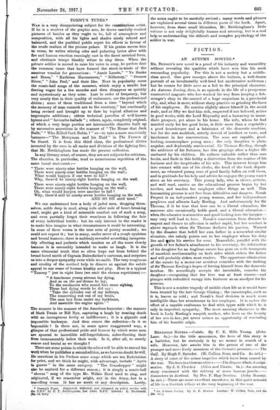TOMMY'S TUNES..
Wars ie a very disappointing subject for the conaeientions artist. If he ie a student of the graphic arts, he draws carefully studied pictures of battles as they ought to be, full of atmosphere and composition, with all his lights and shades nicely echoed and balanced, and the purblind public reject his efforts in favour of the crude realism of the picture palace. If his genius moves him to verse, he writes stirring odes and pulsating lyrics alive with fire and human emotion cunningly cast in the finest metrical form, and obstinate troops blankly refuse to sing them. When the private soldier is moved to raise his voice in song, he prefers first the common tunes that have formed the stock-in-trade of the amateur vocalist for generations : " Annie Laurie," " Ye Banks and Braes," " Kathleen Mavourneen," " Killarney," " Swanee River," " John Peel," and their like. Next in popularity come the music-hall songs of the moment, which enjoy a terrific but fleeting vogue for a few months and then disappear as quickly and mysteriously as they arise. Last in order of frequency, but very nearly first in their quality of endurance, are the professional ditties ; some of them traditional from a time " beyond which the memory of man runneth not to the contrary," but continually being revised and brought up to date by topical allusions and impromptu additions ; others technical parodies of well-known hymns and " favourite ballads " ; others, again, completely original, of which a very large portion are interminable chanties built up by successive accretions in the manner of " The House that Jack
• " Who Killed Cock Robin 1" or—to take a more musicianly instance—" The Merryman and his Maid " in The Yeomen of the Guard. It is from this third class, the professional ditties invented by the men in all ranks and divisions of the fighting-line, that Mr. Nettleingham has made the present collection.
In any literary sense, of course, they are not subjects for criticism. The chanties, in particular, tend to monotonous repetition of the same banal statement :— " There were ninety-nine bottles hanging on the wall, There were ninety-nine bottles hanging on the wall ; What would happen if one were to fall ? Why, there'd be ninety-eight bottles hanging on the wall.
There were ninety-eight bottles hanging on the wall, There wore ninety-eight bottles banging on the wall ; Oh, what would happen were another to fall ? Why, there'd still be ninety-seven bottles hanging on the wall.
AND SO ON until tired." We can understand how a body of jaded men, dragging them- selves, ankle deep in mud, along mile after mile of heartbroaking road, might get a kind of miserable comfort out of such a song, and even partially forgot their weariness in following the fate of every individual bottle ; but its only interest to the reader is to make him imagine in what circumstances it could be interesting. In none of these verses is the true note of poetry sounded ; we could not expect it ; but in many, under cover of a rough cynicism and brutal humour, there is suddenly revealed something inexpress- ibly affecting and pathetic which touches us all the more closely because it is ostensibly intended to make us laugh. It is the came elemental truth that so often leaps out from behind the broad-faced mirth of Captain Bairnsfather's cartoons, and surprises us into a deeper sympathy even while we smile. The very roughness and crudity of the method help to disarm us against the 'subtle appeal to our sense of human kinship and pity. Here is a typical " Tommy " jest in eight lines (we omit the chorus repetitions) :- "A-handsome young airman lay dying,
And as on the aer'drome he lay, To the mechanics who round him came sighing, These last dying words he did say : ' Take the cylinder out of my kidneys, The connecting roil out of my brain, The cam box from under my backbone, And assemble the engine again.' "
The manner is the manner of the American humorist the manner of Mark Twain or Bill Nye, capturing a laugh by treating death with an incongruous levity or indifference ; it is a gigantic ani impossible 'burlesque. And then comes the reflection—Is it so Impossible ? Is there not, in some queer exaggerated way, a glimpse of that professional pride and honour by which some men are spurred to incredible self-forgetfulness, subordinating their lives immeasurably below their work. Is it, after all, so merely coarse and brutal as we thought ?
There are some points in which theeditor Neill be able to amend his work when he publishes a second edition, as we have no doubt he will He mentions in his Preface some songs which are too Rabelaisian for print, and we think he might, with advantage, include " Apres la guerre " in the same category. " The Grasshopper " might also be omitted for a different reason ; it is simply a music-hall " chorus " Bong of the typo Mr. Wilkie Bard used to sing, and originated, if we remember aright, not in the Army, but in a travelling revue. It has no merit of any description. Lastly, • Ironontre, Tones. ' Conurod, Collect.xl. and Arrsored on acelve ekdrlea with the B.F.F. by F. T. tiettlenrdlum, 2nd Lieut. E.F.C. London: E. Ifeedoneld.
PM W. eitg
the notes ought to be °Bretons,' govised ; many words and phrases ace explained several times in different parte of the book. Apart, however, from these small blemishes, Mr. Nettloingham's little volume is not only delightfully human and amusing, but is a real help to understanding the difficult and complex psychology of the soldier in war.






































 Previous page
Previous page